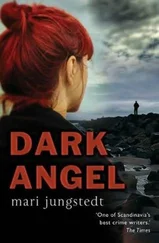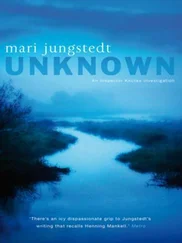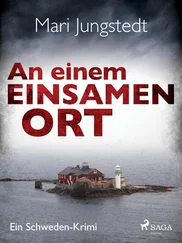The sleeping bag next to hers was empty. She was wearing her watch, which told her it was eleven fifteen. Good God, how could she have slept so long? She peered out again. Tanya was nowhere in sight. Maybe she’d gone for a walk or a swim. But then Vera began thinking more clearly, and memories from the previous evening returned. Those boys from Stockholm. They’d had fun grilling food, swimming and drinking a lot of beer and booze. One of them had a guitar; she’d almost had a crush on him when he played. Then she’d suddenly felt sick and couldn’t sit up any longer; everything began spinning around. She had to go and lie down for a while. She told them she needed to pee and walked away. She threw up in the bushes and then crawled into her sleeping bag behind the windbreak. She’d intended to stay only until she felt better, but she must have fallen asleep .
Again she pushed aside a corner of the windbreak to peer out at the water. The boat was gone. She sank back to the ground. Her throat was parched, and she was hot and thirsty. She staggered to her feet, found a bottle of water and drank some of it. Her head was spinning and she was sick with worry. Where was her little sister? What if something had happened to her?
‘ Tanya!’ she shouted, as loudly as she could .
She walked from one end of the deserted beach to the other without finding her sister. Then she went into the woods to look for her. The longer she searched, the more worried she became. The idyllic beach suddenly felt menacing and inhospitable .
By two o’clock, she had given up searching and packed up as much as she could carry. For safety’s sake, she left behind the windbreak, some food and water, and Tanya’s rucksack. She wrote a note explaining that she’d gone back to the campsite .
Before she left the beach, she turned around one last time, straining to see as far as she could .
But nothing moved .
THE HEAT IN the limestone quarry was almost unbearable.
Morgan Larsson wiped the sweat from his forehead and left the barracks-like office in the western section of the pit, next to the car-wash for the tractor-trailers.
Underneath the broiling sun, the temperature slowly but relentlessly rose to more than 85 degrees, even though it was not yet noon. He got into his pick-up and drove along the road towards the biggest limestone quarry, Fila Hajdar, five kilometres away.
He was going to set things up for the blasting to be done that day.
It was scheduled for eleven thirty. That was the best time, because that was when the shift change took place and most of the workers were on lunch break in the factory’s big cafeteria at the other end of the property.
The road, 200 feet wide, was dusty and white with limestone. The road had to be wide in order to make room for all the vehicles travelling between the factory and the two quarries. The tractor-trailers drove back and forth all day long carrying stone to the big crusher inside the factory, where it was transformed into cement. If they didn’t water the road to keep down the dust, a gigantic dust cloud would be perpetually visible over Gotland.
The vehicles drove the road every day, year round, from six in the morning until ten at night. The only time they took a break was during the daily blasting.
On either side of the road was a lowland forest. Dwarf pines and juniper shrubs looked as if they were fighting for their lives in the arid surroundings. They were covered with white dust, as if someone had sprinkled the entire forest with powdered sugar, producing a ghostlike and sinister impression.
Morgan Larsson waved a greeting to the driver of a fully loaded truck on its way back from the quarry.
He felt the familiar tingling in his stomach that always occurred right before the blasting, when forty thousand tons of stone were broken apart in an instant. Even though he’d participated in so many blastings, he never stopped being fascinated by the sight when enormous chunks of the hillside collapsed, making the huge crater open up even more. There was something irrevocable about the whole spectacle. The rock gave way, cracked open, never to exist again.
When Morgan Larsson reached the quarry, he drove up the slope until he came to the top. He stopped a safe distance from the edge, opened the door of his pick-up and got out. Sweat was running down his back, soaking his armpits and groin. He took the edge off his thirst by finishing off a whole bottle of water in one draught.
His two colleagues, who would help supervise the blasting, were due to arrive in a few minutes. He couldn’t see them from where he was standing, but they had contact via radio. Strict safety measures were enforced so that no one would be in the blast area or even nearby when it occurred. A tremendous explosive force was released when tons of stone were broken away from the edges and roared down into the gigantic pit, which lay below where he stood.
There was a risk that stones would fly through the air. Last year, a fellow worker had died when a rock struck him on the head.
Morgan took up position as close to the edge as he dared and ran his eyes over the rim surrounding the quarry. It was 1,000 yards long and 650 yards wide. The surrounding walls were 200 feet high. It was one of the largest stone quarries in Sweden, and he was proud to be working here. He’d been an explosives expert for almost twenty years, and he enjoyed his job. It was also a big responsibility, making sure that the holes packed with two or three hundred kilos of explosives had each been bored in the right place and at a precise depth.
About 65 feet from the precipice stood a round wooden shed; that was where he took shelter during the actual blasting. Inside was a cable, which he would soon attach to the detonator that was now in his pocket.
He glanced at his watch: ten more minutes. He saw a flash of light from the other side of the quarry. The car with his two colleagues had arrived. They took up positions on either side of the pit, 1,000 yards apart, as they checked that nobody else was in the vicinity. He switched on his radio.
‘Hello, Morgan here. Everything OK?’
‘Sure, it looks deserted,’ he heard Kjell say.
‘Five more minutes.’
‘Fine. Want to have lunch afterwards?’
‘Absolutely. See you then.’
He stuffed the radio in his breast pocket, turned round and walked over to the many deep holes that had been bored in rows along the edge of the quarry. He bent down and checked to see that everything was as it should be.
When he straightened up again, he thought he saw someone moving down below in the pit. What the hell? Such an unexpected development was worrisome, to say the least. Only authorized personnel were allowed here. Especially since only a few minutes remained before the blasting. He rushed over to the pit and shouted. His colleagues were much too far away for him to attract their attention. He fumbled for his radio and managed to switch it on just as he reached the pit opening. Strangely enough, it was completely deserted. He looked up towards the edge of the woods. Nothing. Was it some sort of optical illusion? Maybe it was the heat playing tricks on him. It was almost time to detonate. He glanced up at the sky. Not a cloud in sight, and the sun was like a blazing lamp shining in his face. His mouth was completely dry, and his tongue stuck to his palate. A crackling sound came from his radio.
‘Is everything ready, Morgan?’
‘Yup. I thought I saw somebody, but I must have been imagining things. You haven’t seen anything strange, have you?’
‘No, the quarry is empty. But I can check again with my binoculars, just to be sure. We’ve still got a few minutes.’
Читать дальше












